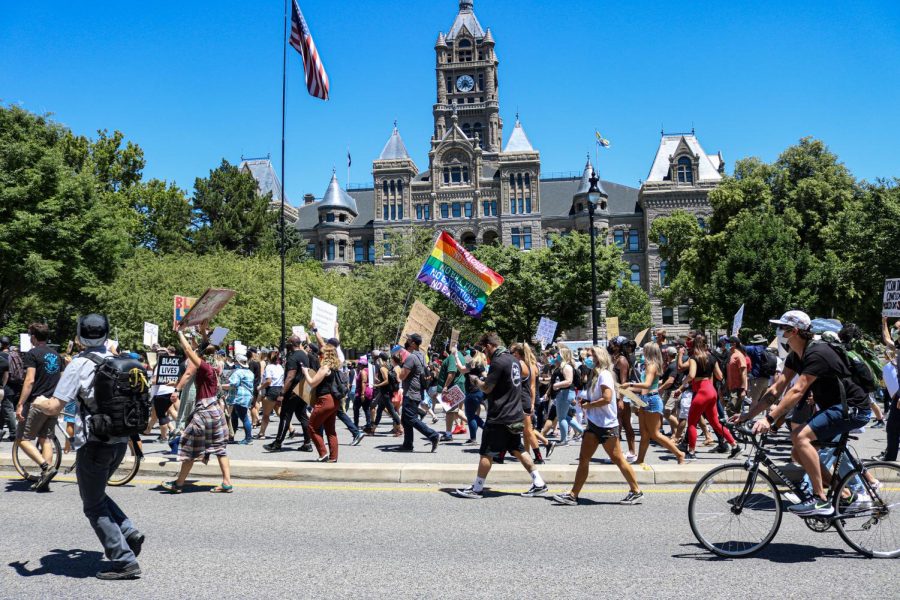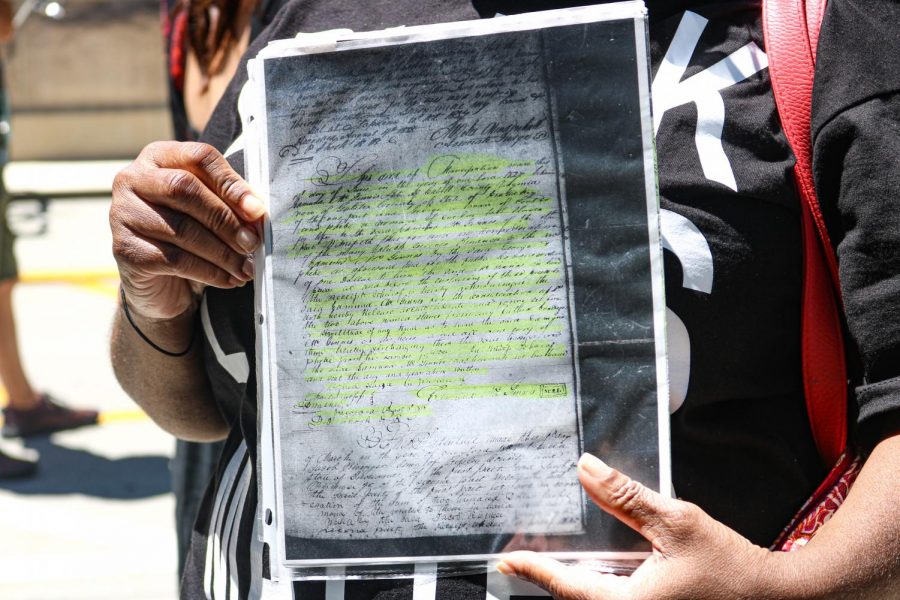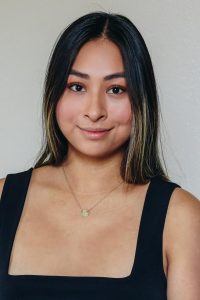Juneteenth: A Celebration of Freedom and Blackness
Demonstrators march in the Juneteenth protest around downtown Salt Lake City on June 19, 2020. ( Photo by Ivana Martinez | Daily Utah Chronicle)
June 20, 2020
Three weeks ago, after coming home from a protest, Natasha Cadet decided she wanted to celebrate.
It came after weeks of heading to the state capitol, marching through downtown Salt Lake and organizing to demand justice for victims of police brutality — George Floyd, Breonna Taylor and locally Bernardo Palacios.
Cadet, an organizer from from Juneteenth Utah, felt tired coming home after each protest. She said she was drained and wanted to do something different for the movement.
“I wanted something a little uplifting and so that’s why I decided to do a Juneteenth protest. It’s a celebration but really whenever we come together like this,” Cadet said in an interview with the Daily Utah Chronicle, motioning to the crowd around Washington Square Park. “It’s a protest, because we’re protesting that you’re gonna see us—our [Black] lives matter.”
Juneteenth is an annual holiday set to commemorate the emancipation of slaves in the United States on June 19, 1865.
Tre Barnes, a lead organizer with Solidarity For Justice, who headed the protest earlier in the day, pointed out that Juneteenth is actually when enslaved African-Americans in Galveston, Texas found out they had been set free — two and a half years after the emancipation proclamation.
“This is not just a protest, it’s Juneteenth. We’re down here celebrating. It’s a day of celebration,” Barnes told the crowd.
The celebration began at 1:30 p.m. at Washington Square Park where the first half of the Juneteenth protest commenced.
Protestors listened to a few speakers before heading out to the streets to march, such as Cythnia White, who had brought her great, great grandmother Phobe Lewis’s emancipation papers to the march and then read a poem she’d written.
Other speakers, such as Former Utah Republican Party Chair James Evans, urged the crowd to update their voter registration by five p.m. that day to affiliate with the Republican party so they may vote in the primary election.
“You need to send a message to the elected officials that, yes, I participated in your primary, because I want police reform and I want to end to systemic discrimination,” Evans said.
Protestors then marched downtown stopping occasionally to listen to speakers.
At the Salt Lake City Public Safety Building, organizers stopped to read the names of individuals who’ve been killed by the police all over the country as protestors laid on the ground.
There, Barnes said the 5.3 million budget cut from the Salt Lake City Police Department wasn’t enough. He said this wasn’t about a series of incremental changes, bias training or a national registry — but a restructuring of the way policing works in Utah.
Barnes made it clear at the protest that it was time to defund the police and invest in the building of healthy communities.
“Our elected officials act as if this is not possible,” Barnes said, “and that crime would rise and our city would fall into anarchy. They pretend this model doesn’t already exist in our state. Well let me tell you about a few secret places in Utah… It’s called Alpine, Wasatch Hollow, Bonneville High, Arcadia Heights. Don’t tell me it doesn’t work. It’s the suburbs. ”
He continued to point out the discrepancies in these places where police presence isn’t an immediate call, in regards to opportunities and resources. As they walked back, protestors chanted “repeal HB-415” and “money into education.”
HB 415 is a bill that restricts the ability to create a police oversight board, to monitor actions of police officers and the police chief.
The march ended back at Washington Square Park where the second half of Juneteenth began. On the east side, a stage was set up for Black performers, speakers, poets, dancers and musicians.
Salt Lake COVID Mutual Aid was in attendance providing water, snacks and masks for attendees. Medics were also present as well as Black-owned businesses — food trucks were lined on the west side.
As the block party continued, organizers like Abena BakenRa occasionally went up to the stage and shared some facts about Juneteenth, the movement or the life expectancy of a Black trans woman, which is anticipated to be 35 years.
“Part of Black lives, is the fact that we’re making all Black lives matter. That means Black trans lives, Black lesbian lives — I don’t want to hear you say Black Lives Matter if you don’t mean all Black lives,” BakenRa said.
“Just last week, a queer Black woman was found hung in a tree, but her life was not investigated because there wasn’t enough noise about it,” BakenRa said.
Organizers continued to emphasize the importance of the Black Lives Matter movement and a celebration of Black culture and community.
Natasha Cadet said the block party was as much a protest as a celebration after several weeks of demanding justice.
Cadet, who turned an idea she had three weeks ago into a celebration of Blackness, wants people to see that Black people can rise.
“Black people just rise. Rise above all the news, above all the media, rise above literally being targeted and just see that we’re humans,” Cadet said. “We’re just as vulnerable as anyone else and just appreciate us and respect us because we’re really beautiful people.”









